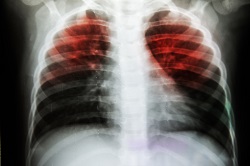Scientists explain how the TB vaccine protects against other diseases
In a study published in the journal ‘Cell Reports’, the research shows that the broad-spectrum effects of the Bacilus Calmette-Guerin (BCG) vaccine could be mediated by metabolic and epigenetic changes in white blood cells called monocytes in a process called ‘trained immunity’. The discovery could allow for the development of strategies that combine immunological and metabolic stimulation to boost the effectiveness of vaccines and anti-cancer therapies. ‘The implicationsfindings are double: On the one hand, we have uncovered new biological interactions that link cellular metabolism with immune responses, and on the other hand, we have opened the door for new therapeutic approaches in which metabolism modulators modulate innate immune responses and can serve as potential novel immunotherapies,’ commented senior study author Mihai Netea. ‘However, what it is important to realise is that this is the beginning of the process to bring this to clinical practice, and more studies are needed for that.’ Many studies have shown BCG’s capacity to protect against infections other than tuberculosis, for example early administration reduces child mortality, mainly due to a reduction in lower respiratory infections and harmful immune responses triggered by infections. BCG can also be used to treat bladder cancer and has had promising results for other conditions, such as asthma and parasitic diseases. But why BCG is effective against other conditions has been somewhat of a mystery. To unlock the secret, Netea and his team examined BCG-induced metabolic changes in innate immune cells called monocytes. They discovered that vaccination induced a strong, long-lasting increase in glycolysis and, to a lesser extent, glutamine metabolism in mice and humans. This shift in glucose metabolism toward glycolysis was necessary to trigger trained immunity. This process relies on epigenetic changes, which affect gene activity without altering the DNA sequence, to enhance the ability of innate immune cells to recognise and mount more effective responses against previously encountered pathogens. Specifically, BCG-induced metabolic changes were required to induce modifications to proteins called histones, which act as scaffolds around which DNA wraps. In the human cohorts, single-nucleotide variations in genes encoding glycolysis enzymes affected the induction of trained immunity in monocytes. Taken together, the results show that cellular metabolism reprogramming is a central process involved in BCG-induced trained immunity. ‘These findings change the concept that the innate immune system cannot adapt in the long-term after an infection or vaccination,’ Netea says. ‘The whole concept that the function of innate immune cells can change in a stable way, for example, being improved by certain vaccines such as BCG, is a paradigm shift in immunology, as until not too long ago it was assumed that only the adaptive immune system can adapt to previous infections or vaccinations.’ The next step will be to conduct a bigger, broader analysis of circulating monocytes in BCG-vaccinated individuals at risk of infection. ‘In the future, bigger studies should assess inter-individual variation in these responses, in order to be able to identify which factors influence vaccination responses at the level of a person,’ Netea concludes. ‘In the end, a better understanding of BCG-induced trained immunity could lead to the development of strategies that alter cellular metabolism pathways to improve human host defence mechanisms and boost the effectiveness of vaccines and immunotherapy in patients.’ The MENTORINGTREGS project has received EUR 1.5 million of EU funding and will continue until April 2018. SYSBIOFUN received just under the same amount of EU backing and will end in December 2017. For more information, please see: MENTORINGTREGS project page on CORDIS SYSBIOFUN project page on CORDIS
Countries
Italy, Netherlands



